India's sincerity key to ending conflict before winter
By Liu Caiyu Source: Global Times Published: 2020/9/17 12:20:14
Russia uses multilateral platforms to mediate border talks

File photo of Yang Jiechi:Xinhua
The Meeting of BRICS National Security Advisors on Thursday is a good opportunity to ease the ongoing border tensions between China and India, with experts saying that expectations of disengagement and de-escalation near the Line of Actual Control are high. But whether border tensions can be peacefully settled before winter depends on India's sincerity.
Yang Jiechi, a member of the Political Bureau of the Central Committee of the Communist Party of China (CPC) and also director of the Office of the Foreign Affairs Commission of the CPC Central Committee, will attend the BRICS (Brazil, Russia, India, China, South Africa) videoconference organized by Russia. Indian National Security Adviser Ajit Doval is also expected to attend.
While the agenda focuses on terrorism, cybersecurity and cooperation, and no meeting between China and India has been scheduled so far, expectations that Yang and Doval will use the platform to take the dialogue forward on disengagement and easing border tensions are running high.
Even when multiple rounds of talks failed to ease tensions, with a troop build-up in the region, the two countries did not stop seeking opportunities for talks. Chinese observers view the BRICS as an important platform for the two countries to discuss the border issues and reach some common ground, with Russian mediation.
Zhao Gancheng, director of the Center for Asia-Pacific Studies at the Shanghai Institute for International Studies, told the Global Times that since Yang and Doval have known each other for a long time, the meeting at BRICS brings hopes of peace, and shows their willingness to pursue as many opportunities as possible to handle the tensions.
But Zhao said that whether the ultimate solution will be reached depends on India, as it has been showing no sign of conceding since the border standoff in May, and continues to provoke the PLA.
Ahead of the meeting, reports from Indian media said that the Indian army is ready to be deployed in the harsh winter months. India has also been imposing sanctions on Chinese firms and apps since the standoff, seen by observers as hyping up domestic nationalist sentiments.
The joint statement and five-point consensus reached by both Chinese and Indian foreign ministers in Moscow marked a substantial step in cooling the current border situation, but none of them were realized, as India failed to keep its word, experts noted.
Hu Zhiyong, a research fellow at the Institute of International Relations of the Shanghai Academy of Social Sciences, told the Global Times that China should be prepared to face the fact that a consensus with India is possible if they meet, but should also remain vigilant over whether India can keep its promises.
By continuously going back on their word, India is wasting the opportunities and high expectations to peacefully settle border tensions before winter, Chinese experts said.
Their attitude to agreements has disappointed China, but China has not stopped to solve the crisis in a peaceful manner, experts said, and called on India to show their sincerity at this time as well.
Since the standoff in May, officials of China and India have had several opportunities to solve the problems and maintain regional peace, including the mechanism of the Shanghai Cooperation Organization (SCO) and BRICS, with Russian mediation. India and China have been tasked to maintain regional peace, and that there's no reason for them to be hostile neighbors, Chinese observers said.
Russia, which maintains good ties with both China and India, has been playing a key role in de-escalation by offering a platform for the two countries, Qian Feng, director of the research department at the National Strategy Institute of Tsinghua University in Beijing, told the Global Times on Thursday. As a neutral mediator, Russia understands the sensitive concerns of each side, and has been low-key in multilateral platforms on the China-India conflict.
When Russia sold jet fighters to India in July amid the military conflict, some said Russia was turning against China, which was slammed by Qian as misleading.
Arm sales between Russia and India are a long-term deal, and have nothing to do with the China-India conflict, and does not mean Russia favors India, Qian said, adding some military equipment cannot alter the balance of strength between India and China.
But Song Zhongping, a Chinese military expert, emphasized that solving the border conflict relies on China and India, and that Russia only plays the role of a mediator.
Song believes disagreement between the two can be managed and controlled, and the overall development of the two countries must be prioritized. The various bilateral or multilateral cooperation mechanisms that both countries get involved in shows that opportunities for cooperation between China and India are greater than competition, Song said.
Posted in: DIPLOMACY